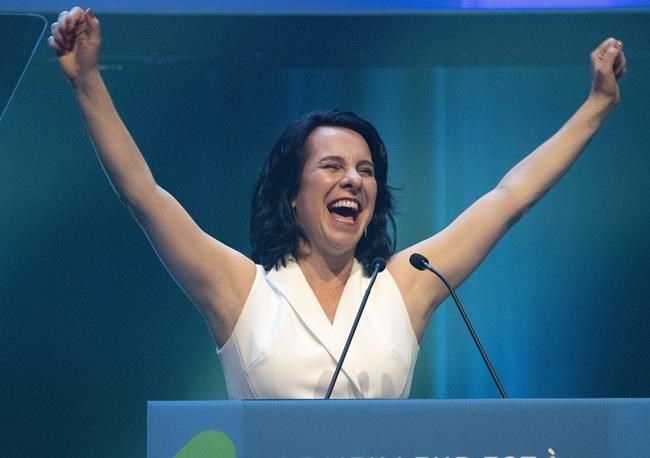MONTREAL — Valérie Plante was re-elected mayor of Montreal on Sunday, beating rival Denis Coderre for the second time in a row.
Plante had captured more than 52 per cent of the votes as of 11:30 p.m., when 88 per cent of polls were reporting. Coderre, the one-term mayor Plante ousted in 2017, had roughly 38 per cent of votes.
Plante campaigned on her record leading Montreal during the pandemic and promised to focus on fighting climate change and building more social housing.
"We have a unique opportunity to accelerate our ecological transition and to position Montreal at the global forefront of the economy of the future," Plante told supporters at a victory party in downtown Montreal.
Plante, who is known for her trademark laugh, said her re-election was proof that Montrealers appreciated her style of government and that "yes, you can lead Montreal with a smile."
"Tonight, I'm proud to say I will continue to be the mayor and we will continue to be the team of all Montrealers," she said. "You have given us the privilege and honour to be your administration once again and we take this responsibility very seriously, you can count on us to be there and to listen and to represent all of you."
In a defiant concession speech, Coderre, a former federal Liberal cabinet minister, repeated many of the same themes of his campaign: that Montreal is dirty, dangerous and has lost its influence.
"The result is clear, you win some you lose some. But I'm very pleased that I was pushing ideas, I'm very, very pleased that no matter what the kind of label that they tried on me, that I was focusing on the ideas and I was focusing on the people, because I love the people, I love Montreal," Coderre told supporters.
Plante ran a largely positive campaign, though the final days of the race took a nastier tone, with the two main candidates accusing each other of lacking integrity. Coderre accused Plante of not caring about sexual assault victims and Plante attacked Coderre for hiding his business dealings.
Plante's margin of victory appears larger than in 2017, when she beat then-incumbent Coderre, with 51.42 per cent of the vote to his 45.66 per cent.
Plante also appears poised to increase her majority on Montreal city council, with members of her Projet Montréal party leading in 38 of the 65 council seats.
Former CFL player turned lawyer Balarama Holness was in third place with 7.29 per cent of the vote.
While the Montreal saw the incumbent run against a former mayor, Quebec's next four largest city's saw their incumbents step down.
In Quebec City, Bruno Marchand appears likely to win a tight race with 32.32 per cent of the vote and all votes counted.
Several television networks declared Marie-Josée Savard, who had been endorsed by the city's long-time mayor Régis Labeaume, the winner early in the night, only to retract the declaration.
Marchand, who led by less than 1,000 votes, is the former director of the United Way in the region and campaigned on a platform of improving neighbourhood-focused development, the environment and making the municipal administration more transparent.
A tramway project that had been supported by Labeaume and a tunnel that the provincial government wants to build between the city's downtown the suburbs were major issues in the province's second largest city.
In Laval, Montreal's large northern suburb, Stéphane Boyer was leading with 41.4 per cent of the vote and almost all votes counted. Boyer has been described as the "heir" of incumbent mayor Marc Demers, who was first elected in 2013 and now leads the municipal party founded by Demers.
Plante, the first woman elected mayor of Montreal, was not the only Woman to win a major race in the province, women are leading or elected in three of the province's five largest cities.
In Gatineau, near Ottawa, France Bélisle, a former journalist who more recently headed the regional tourism office, was leading with 42.8 per cent of the vote and almost all votes counted.
In Longueuil, a large suburb of Montreal, Catherine Fournier, a 29-year-old member of the province's legislature, was leading with more than 60 per cent of the vote.
This report by The Canadian Press was first published on Nov. 7, 2021.
—â¶Ä”â¶Ä”
This story was produced with the financial assistance of the Facebook and Canadian Press News Fellowship.
Jacob Serebrin, The Canadian Press




